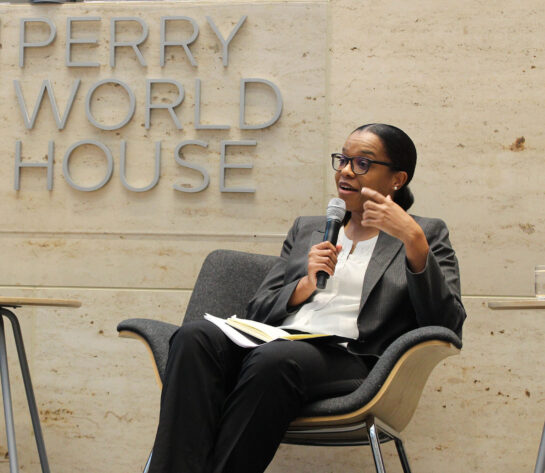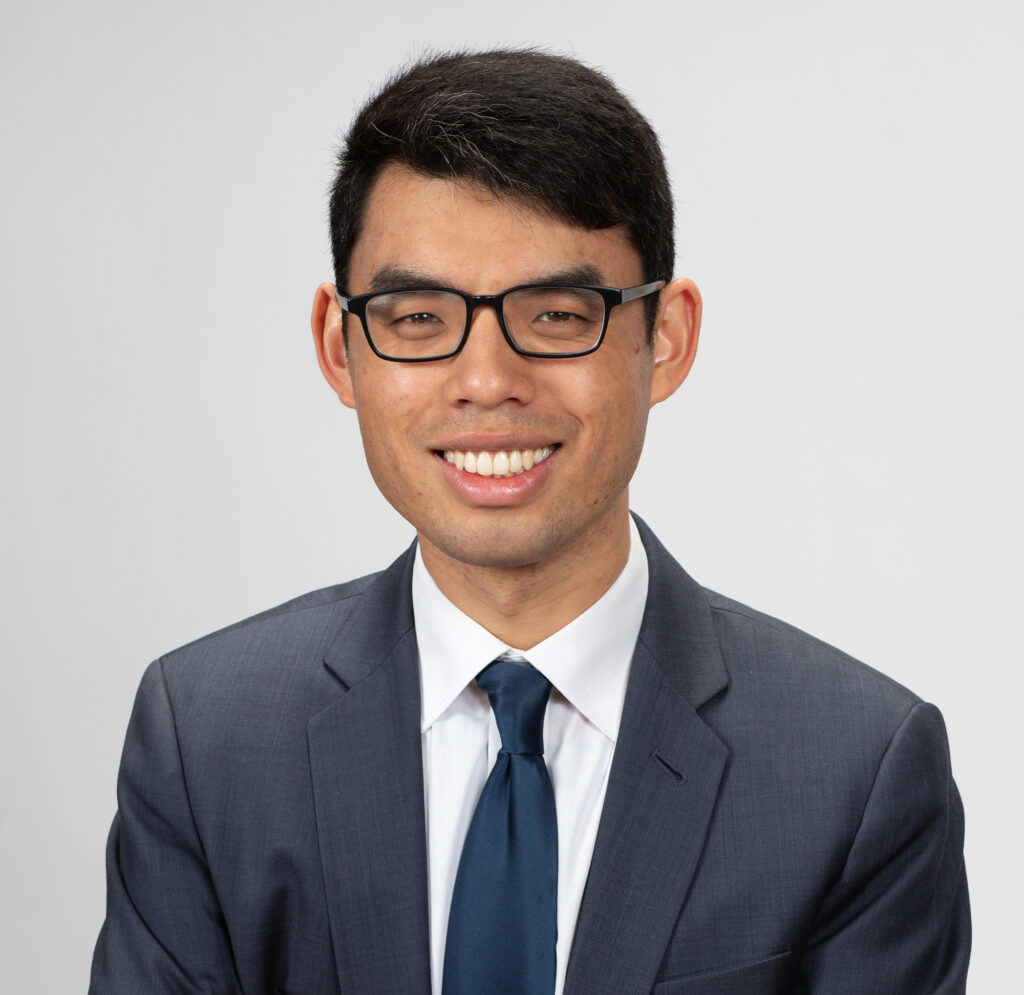Lightning Scholars
This program brings untenured, but tenure-track, faculty from around the world to Philadelphia for a semester or year of writing, fellowship, and bridging the gap between academia and the policy world.

Perry World House connects Penn to the international policy world through research, student engagement, and public programming, bringing the university’s intellectual resources to bear on the urgent global challenges of the 21st century.
This fellowship program allows untenured faculty members at leading research universities around the world to join Perry World House and the Penn community for a semester or full academic year in residence in Philadelphia to produce a major research project or book. While the fellowship program is for faculty working on global affairs topics, preference will be given to faculty working on subjects broadly related to our four research themes: climate, democracy, global justice and human rights, and security.
The ideal candidates for this program will be looking for an in-residence fellowship away from their home institution that will provide the space and support to write, but also the opportunity to collaborate with an interdisciplinary and vibrant community of global affairs scholars and practitioners. Perry World House is especially interested in faculty whose work connects to important global policy conversations and who will want to engage in dialogue with some of the many policymakers from around the world who visit Perry World House.
The program’s compensation is significant and negotiated on a case-by-case basis. The program is intended to allow the selected Lightning Scholar to take a comfortable leave from their home institution often by supporting the difference between a one semester sabbatical provided by the home institution and a full year leave.
Applications for the 2026-27 Lightning Scholar Fellowship are open until December 1, 2025.
2025-26 Lightning Scholar
Andi Zhou

Andi Zhou’s research examines the politics of interstate territorial disputes, with a particular focus on the role of domestic politics, public opinion, and political psychology. Before coming to Perry World House, Andi was an assistant professor of political science at the United States Naval Academy. His work is forthcoming in the Journal of Politics and has been supported by the Eisenhower Institute’s Clifford Roberts Graduate Fellowship. He has also worked in the public and non-profit sectors before entering academia, and his policy writing has appeared in The Diplomat and other outlets. Andi received his Ph.D. in Government from Harvard University.
2024-25 Lightning Scholars
Samantha Bradshaw and Lama Mourad

Samantha Bradshaw is the director of the Center for Security, Innovation & New Technology at American University, as well as assistant professor at American University’s School of International Service. She is a research fellow at the Center for International Governance Innovation. Prior, she was a fellow at Schmidt Futures International Strategy Forum (North America), as well as a postdoctoral research fellow at Stanford University working at the Center for Democracy, Development and the Rule of Law the Digital Civil Society Lab, and the Program for Democracy and the Internet.

Lama Mourad is an Assistant Professor at the Norman Paterson School of International Affairs at Carleton University. Her work focuses on the intersection of forced migration, local governance, and the politics of borders, with a regional focus on the Middle East. She has been published in both academic and public outlets, including the Journal of Refugee Studies, Middle East Law and Governance, Forced Migration Studies, and the European Journal of International Relations, as well as in Foreign Policy, The Globe and Mail, The Atlantic, Lawfare, The Washington Post’s Monkey Cage, and The Toronto Star. Dr. Mourad’s research has been supported by several institutions and agencies, including the Harvard Kennedy School’s Middle East Initiative, the Social Sciences and Humanities Research Council, the International Development Research Centre (IDRC), and the Project on Middle Eastern Political Science (POMEPS). She has previously held fellowships at Perry World House, University of Pennsylvania, and with the Middle East Initiative at the Harvard Kennedy School of Government. She received her PhD from the Department of Political Science at the University of Toronto, and was awarded the American Political Science Association’s (APSA) Best Dissertation in Migration & Citizenship in 2020.
2023-24 Lightning Scholar
Michael Kenwick

Michael Kenwick is an assistant professor of political science at Rutgers University. He studies international security with an emphasis on civil-military relations and international border politics. His research has been supported by the National Science Foundation and has appeared in a variety of journals including the American Journal of Political Science, International Organization, and the Journal of Politics. From 2017 to 2019, he was a postdoctoral fellow at Perry World House, where he played an active role in establishing the Borders and Boundaries Project, a multidisciplinary initiative exploring the causes and consequences of intensified border control efforts. He received his PhD in political science from the Pennsylvania State University, and his BA in political science and history from the University of Illinois.
2022-23 Lightning Scholar
Stacy-ann Robinson

Stacy-ann Robinson is assistant professor of environmental studies at Colby College, having held previous appointments at Yale University and Brown University. She researches the human, social, and policy dimensions of climate change adaptation in Small Island Developing States, with a special focus on climate justice and adaptation finance, an area in which she is a certified expert. Her work has appeared in Nature, Nature Climate Change, Wiley Interdisciplinary Reviews (WIREs): Climate Change, Climate Policy, and other leading journals. She is also a Contributing Author to Chapter 15 (Small Islands) of Working Group II’s contribution to the Intergovernmental Panel on Climate Change (IPCC)’s Sixth Assessment Report, which was released in February 2022. Outside of academia, Robinson has fifteen years’ experience in the government, non-profit, and private sectors, including time spent representing the Government of Jamaica in the Second Committee (Economic and Financial) of the United Nations General Assembly and the International Seabed Authority.
2021-22 Lightning Scholar
Jane Vaynman

Jane Vaynman is an Assistant Professor of Political Science at Temple University. Vaynman’s work focuses on security cooperation between adversarial states, the design of arms control agreements, and the effects of emerging technology on international institutions. She is the co-founder of the Nuclear Studies Research Initiative, a project that promotes intellectual exchange and cross-fertilization for emerging nuclear research in policy, history, and political science. Previously, she was a Stanton Nuclear Security Fellow at the Council on Foreign Relations, and has also held positions with the Elliott School of International Affairs, U.S. Department of State and the Carnegie Endowment for International Peace. She was a Fulbright Fellow at the Carnegie Moscow Center in 2006-2007. She received her Ph.D. in political science from Harvard University and B.A. in international relations from Stanford University.
2020-21 Lightning Scholar
Melissa Lee

Melissa Lee is anAssistant Professor of Politics and International Affairs at Princeton University’s Department of Politics and the Woodrow Wilson School. She studies foreign subversion, alongside the international and domestic politics of statebuilding and state capacity. Lee’s first book, Crippling Leviathan: How Foreign Subversion Weakens the State,was published in 2020. Lee received her Ph.D. in Political Science from Stanford University and B.A. in Political Science from the University of California, San Diego.
2019-20 Lightning Scholar

Sarah Bush is an Associate Professor of Political Science at Yale University. In 2015, she wrote The Taming of Democracy Assistance: Why Democracy Promotion Does Not Confront Dictators (Cambridge University Press). She received her Ph.D. from Princeton University, and her B.A. from Northwestern University.
2018-19 Lightning Scholar

Cosette Creamer is an Assistant Professor of Political Science at the University of Minnesota and affiliated faculty at the University of Minnesota Law School. Her research spans trade and economic law, international arbitration and dispute resolution, international business transactions, human rights, criminal law and procedure, the laws of war, and comparative policing practices. She received her Ph.D. from Harvard University (2016), J.D. from Harvard Law School (2010), M.A. from the University of Chicago in International Relations (2004), and B.A. from the University of Chicago in International Studies (2002).

